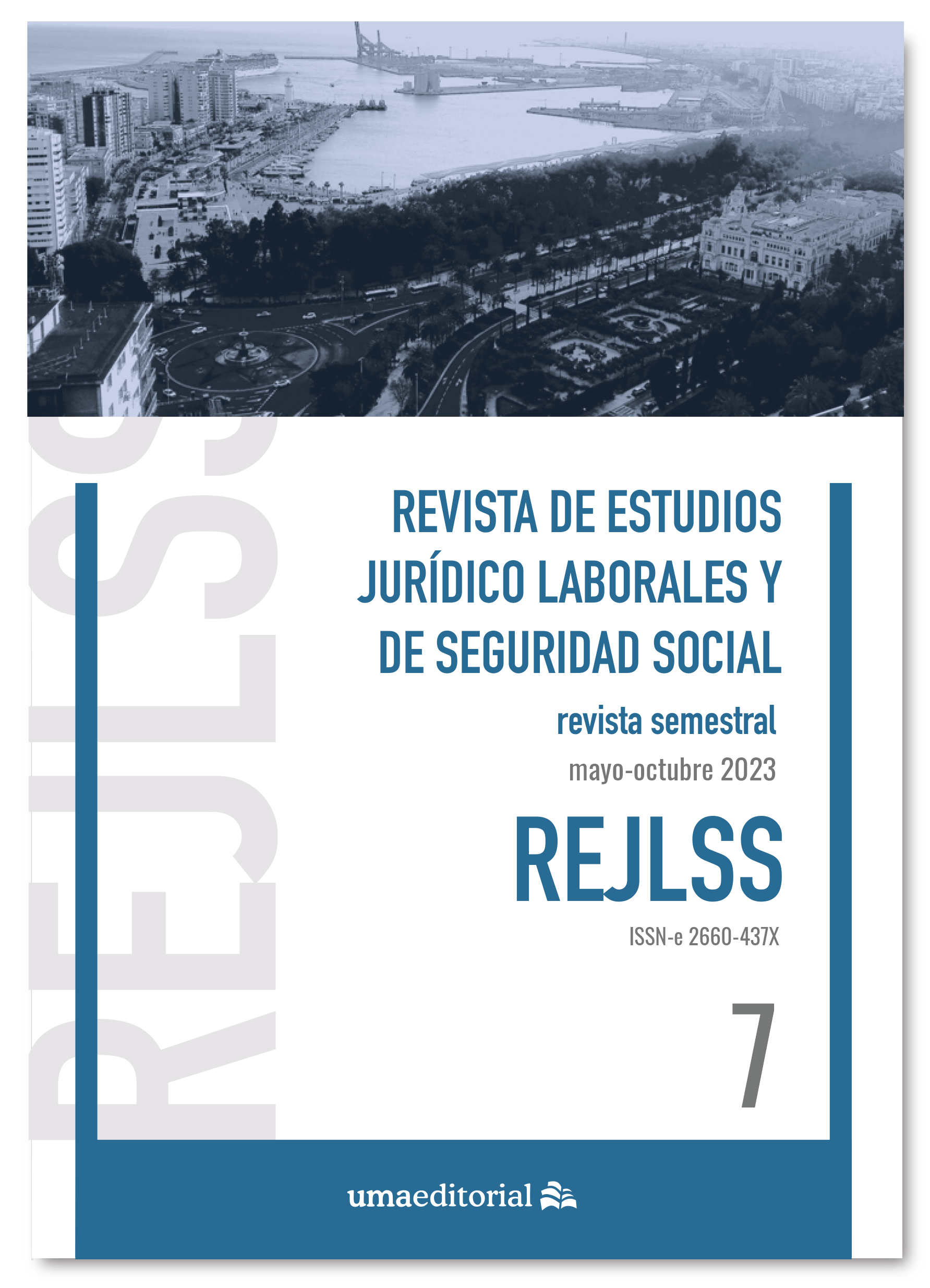Artificial intelligence and hiring job
DOI:
https://doi.org/10.24310/rejlss7202317557Keywords:
artificial intelligence, discrimination, digital algorithms, equality, labor law, genderAbstract
Digital disruption has revolutionized many aspects of life, including the process of hiring employees. In this new context, there has been a significant transformation in the way companies select candidates for their job positions. Instead of relying solely on paper resumes, platforms and intelligent internet-based systems are now used to analyze applicants’ profiles quickly and efficiently. This approach provides a more objective and efficient selection process for companies, enabling them to identify the most suitable candidates for the job position. However, the rapid and widespread application of such artificial intelligences by companies has generated an unprecedented context, a legal gray area that escapes the control of laws and makes regulation difficult.
Downloads
Metrics
Publication Facts
Reviewer profiles N/A
Author statements
Indexed in
-
—
- Academic society
- N/A
- Publisher
- Universidad de Málaga. UMA Editorial
References
Abadías Selma, A., García González G., Protección de los trabajadores e inteligencia artificial: la tutela de los derechos sociales en la cuarta revolución industrial, Atelier, Barcelona, 2023.
Aragüez Valenzuela, L., “Los algoritmos digitales en el trabajo, Brechas y sesgos”, Relaciones Laborales y Derecho del Empleo, 2021.
Asquerino Lampero, M. J., “Algoritmos y discriminación”, Realidad social y discriminación: estudios sobre diversidad e inclusión laboral, 2022.
Baeza Yates, R., Peiró, K., ¿Es posible acabar con los sesgos de los algoritmos?, https://users.dcc.uchile.cl/~rbaeza/bias/sesgos-algoritmos.html, 2019.
Fernández Ramírez, M., “Nuevos paradigmas para los derechos fundamentales del trabajo en la era tecnológica”, Revista de Estudios Jurídico Laborales y de la Seguridad Social, núm. 5, 2022, DOI: https://doi.org/10.24310/rejlss.vi5.15115.
García, R. F., “El presentismo laboral: una amenaza silenciosa”, Gestión práctica de riesgos laborales: Integración y desarrollo de la gestión de la prevención, 83, 2011.
García González, G., “La gestión algorítmica del trabajo: riesgos y desafíos”, en Abadías Selma, Alfredo; García, G.(Coordinadores), Protección de los trabajadores e inteligencia artificial: la tutela de los derechos sociales en la cuarta revolución industrial, Atelier, Barcelona, 2022.
Lara, C. S., “El Algoritmo como protagonista de la relación laboral, Un análisis desde la perspectiva de la prohibición de discriminación”, Temas laborales: Revista andaluza de trabajo y bienestar social, 155, 2020.
Mercader Uguina, J., Algoritmos e inteligencia artificial en el derecho digital del trabajo, Tirant lo blanch, Valencia, 2022.
Mendoza, D., “Racismo y roles de género, conductas perpetuadas en algoritmos de inteligencia artificial”, Coloquio, 65, 2020.
Molina Hermosilla, O., “Inteligencia artificial, Bigdata y Derecho a la protección de datos de las personas trabajadoras”, Revista de Estudios Jurídico Laborales y de la Seguridad Social, núm. 6, 2023, DOI: https://doi.org/10.24310/rejlss.vi6.16225.
Monereo Pérez, J. L., Molina Navarrete, C., Moreno Vida M. N., Vila Tierno, F., Manual de Derecho del Trabajo, Comares, Granada, 2022.
Nieva Fenoll, J., “La impronta de la inteligencia artificial en el proceso”, en Inteligencia artificial y proceso judicial, Marcial Pons, Madrid, 2018.
Rojo Torrecilla, E., “Una política de empleo adecuada para los cambios en las relaciones laborales del siglo XXI: Estudio de la Ley 3/2023 de 28 de febrero, de Empleo”, Revista de Estudios Jurídico Laborales y de Seguridad Social, núm. 6, 2023, pág. 30, DOI: https://doi.org/10.24310/rejlss.vi6.16187.
Soriano Arnanz, A., “El uso de la inteligencia artificial en la selección y gestión del personal de las administraciones públicas”, Documentación Administrativa. Nueva época, 9, 2023.
Vila Tierno, F., “Tiempo de reformas ¿o no?”, Revista de Estudios Jurídico Laborales y de Seguridad Social, núm. 2, 2021, DOI: https://doi.org/10.24310/rejlss.vi2.12441.
Downloads
Published
How to Cite
Issue
Section
License
Copyright (c) 2023 José Iván Pérez López

This work is licensed under a Creative Commons Attribution-NonCommercial-NoDerivatives 4.0 International License.
In the Revista de Estudios Juridico Laborales y de Seguridad Social (REJLSS) we are clearly committed to a policy of open access to scientific knowledge (See Berlin Declaration).
Those authors who have publications with this journal accept the following terms:
This journal provides immediate free access to its content under the principle of making research freely available to the public. All the contents published in the REJLSS are subject to the Creative Commons license
Attribution-NonCommercial-NoDerivatives 4.0 International (CC BY-NC-ND 4.0)
Copyrights are of two kinds: moral and patrimonial. Moral rights are perpetual, inalienable, non-transferable, inalienable, unattachable and imprescriptible prerogatives. In accordance with Spanish copyright legislation, the authors who publish in REJLSS retain the moral right over their work, as well as the ownership of the patrimonial right, which will be transferred to the University of Malaga for its dissemination in open access.
The patrimonial rights, refer to the benefits that are obtained by the use or disclosure of the works. REJLSS is published in open access and is exclusively authorized to perform or authorize by any means the use, distribution, dissemination, reproduction, adaptation, translation or transformation of the work.
It is the responsibility of the authors to obtain the necessary permissions of the images that are subject to copyright.
Authors whose contributions are accepted for publication in this journal retain the non-exclusive right to use their contributions for academic, research and educational purposes, including self-archiving or depositing in open access repositories of any kind.
The electronic edition of this magazine is edited by the Editorial of the University of Malaga (UmaEditorial), being necessary to cite the origin in any partial or total reproduction.
The authors may adopt other non-exclusive license agreements for the distribution of the version of the published work (eg: deposit it in an institutional telematic archive or publish it in a monographic volume) provided that the initial publication is indicated in this magazine.
Authors are allowed and recommended to disseminate their work through the Internet (eg, in institutional telematic archives or on their website) before and during the submission process, which can produce interesting exchanges and increase citations of the published work.







19.png)
